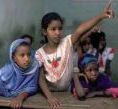Mainstreaming HIV and AIDS in Education in Emergencies
From 01-04-2009 to 04-04-2009 (Turkey)

The additional vulnerabilities and risks to HIV infection that children and young people face in humanitarian settings were the focus of a workshop organized by the Inter-Agency Network for Education in Emergencies (INEE) Task Team and the UNAIDS Inter-Agency Task Team (IATT) on Education at the INEE Global Consultation (31 March – 3 April 2009 in Istanbul, Turkey).
The workshop was held to initiate work on a guide to mainstreaming HIV and AIDS education in emergencies for education officers, emergency actors and development partners, building on the IATT on Education’s Toolkit for Mainstreaming HIV and AIDS in the Education Sector.
The workshop provided an opportunity for discussions and in-depth orientation around the extent to which HIV-related prevention, care and support issues are included in education responses in emergencies.
Discussions in the workshop focused on four topics – youth participation, gender, access to services and life skills education. The discussion was followed by task-oriented group work to develop educational modules for mainstreaming HIV prevention, care and support issues in education in emergencies.
Workshop participants emphasized that it was important to:
- Ensure that all tools developed by the INEE and/or the Global Education Cluster mainstream HIV and AIDS;
- Consider adapting for the school setting an International Code of Conduct that has zero tolerance for gender-based violence and stigma and discrimination;
- Link the education sector more strongly with other sectors such as protection, health and nutrition, to ensure access to services and to further ensure mechanisms to enhance such linkages without over-burdening schools.
The finalised guide will complement the IATT Toolkit and facilitate the strengthening of HIV and AIDS issues in the updated INEE Minimum Standards and other tools for emergency work in education.
Approximately 250 practitioners, researchers and policy-makers from national and international NGOs, UN agencies, multilateral institutions, government agencies, ministries of education, teachers’ unions, academic institutions and youth groups took part in the INEE Global Consultation, which was held on the theme of “Bridging the Gaps: Risk Reduction, Relief and Recovery”.
- Organizer: INEE
- Start date (local time): 01-04-2009 8:00 am
- End date (local time): 04-04-2009 8:00 am
- Istanbul
Istanbul
Turkey


